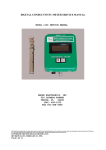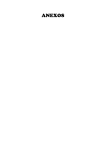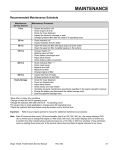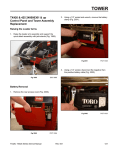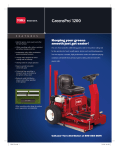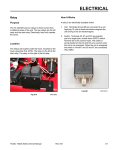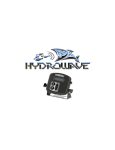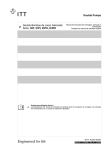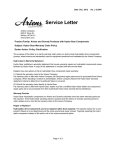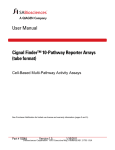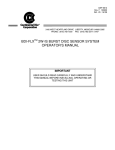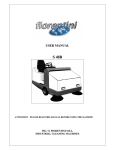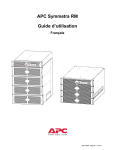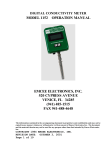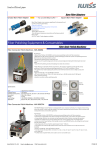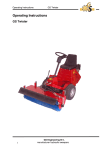Download DRIVE SYSTEM
Transcript
DRIVE SYSTEM TX420 & 425 All Serial Numbers 4. Remove the spring from the idler arm (Fig. 1132). Drive Belt Removal 1. Shut engine off, apply parking brake, and remove ignition key. 2. Open the engine hood assembly. 3. With a spring removal tool (Toro P/N 92-5771), connect the tool to the spring end located on the stud bolted to the loader tower edge. Pull up on the spring end to remove the spring from the bolt stud (Fig. 1131). Fig 1132 PICT-1441 5. Remove the belt from the pulleys (Fig. 1133). Fig 1131 DSC-0587 TX420, TX425 Series Service Manual Rev. 001 Fig 1133 DSC-0591 8-1 DRIVE SYSTEM Drive Belt Installation 1. Install the drive belt around the engine crankshaft pulley, two hydrostatic pump pulleys, and the idler pulley (Fig. 1134). A 3. Using the spring removal tool (Toro P/N 92-5771), install the spring to the stud located on the loader tower (Fig. 1136). A C B A. Hydrostatic pulley B. Crankshaft pulley Fig 1134 8-2 DSC-0594 belt routing diagram TX420 & 425 All Serial Numbers C. Idler pulley Lifting Unit for Service 2. Install one end of the idler spring to the idler arm (Fig. 1135). Fig 1136 Fig 1135 DSC-0592 1. Place two pieces of approximately 2” (5.08cm) thick wood directly behind both tracks (Fig. 1137). Rev. 001 Fig 1137 DSC-0596 TX420, TX425 Series Service Manual DRIVE SYSTEM 2. Back the unit up onto the wood blocks (Fig. 1138). Fig 1138 4. Raise the rear of the unit, remove the two wood blocks and install a jack stand under each corner of the frame (Fig. 1140). DSC-0597 3. Place a hydraulic floor jack under the rear frame of the unit (Fig. 1139). Fig 1139 DSC-0600 5. Raise the hydraulic floor jack approximately 15” (38.10cm) and position it at the front of the unit (Fig. 1141). DSC-0598 TX420, TX425 Series Service Manual Fig 1140 Rev. 001 Fig 1141 DSC-0601 8-3 DRIVE SYSTEM 6. Start the unit and raise the loader arm enough to clear the hydraulic floor jack. Place the floor jack directly below the quick attach plate and lower the loader arm onto the hydraulic floor jack. Continue lowering the loader arm to raise the tracks off the ground (Fig. 1142). 8. Lower the hydraulic floor jack so the unit rests on the jack stands (Fig. 1144). Fig 1142 DSC-0603 7. Install two jack stands under the front frame (Fig. 1143). Fig 1144 DSC-0605 9. Make sure the unit is securely supported by the jack stands. TX420 All Serial Numbers Track Removal 1. Raise and secure the unit off the ground. Refer to “Lifting Unit for Service”, page 8-2. 8-4 Fig 1143 DSC-0604 Rev. 001 TX420, TX425 Series Service Manual DRIVE SYSTEM 2. Remove the bolt and nut securing the tensioner bolt (Fig. 1145). D Note: Serial number 250000399 and below may have square tensioner arms. CBA A. Locking bolt B. Tensioning screw Fig 1145 DSC-0606 3. Using a 1/2” drive ratchet, release the drive tension by turning the tensioner bolt clockwise until the tensioning nut contacts the tensioner bolt head. Push the tension wheel toward the rear of the unit (Fig. 1146 and Fig. 1147). Fig 1146 TX420, TX425 Series Service Manual fig. 34 m-4747 C. Tension tube D. Tension wheel 4. Make sure the loader arms are raised. Begin removing the track at the top of tension wheel, lifting up on the track to remove the slack from the bottom (Fig. 1148). Fig 1147 Fig 1148 DSC-0608 DSC-0607 Rev. 001 8-5 DRIVE SYSTEM 5. Start working the track off the front tension wheel while rotating the track forward (Fig. 1149). 7. Remove the track off the rear drive wheel (Fig. 1151). Fig 1149 DSC-0609 6. Use a pry bar to help assist in removal of the track (Fig. 1150). Fig 1151 DSC-0611 TX420 All Serial Numbers Tensioner Wheel Bearing Replacement Note: The tensioner arm could have a square or round tube. This procedure is the same for both. 1. Remove the tensioner arm assembly out of the frame (Fig. 1152, square tube, or Fig. 1153, round tube). Fig 1150 DSC-0610a 8-6 Rev. 001 Fig 1152 CLR DSC-1724 TX420, TX425 Series Service Manual DRIVE SYSTEM 3. Support the tensioner wheel so there is a space under it for bearing removal. Using a hammer, drive the upper bearing down to create a gap between spacer and bearing, then use a drift punch to hammer the lower bearing out. The spacer will fall out when the bearing is removed. Turn the tensioner wheel over and drive out the other bearing. Inspect the tensioner wheel housing and spacer (Fig. 1155) Fig 1153 DSC-0613 2. Remove the bolt and nut holding the tensioner wheel to the tensioner arm (Fig. 1154). Fig 1155 CLR DSC-0808 Bearing Installation Note: The raised inner race of the bearing should be facing outward on both bearings on the tensioner wheel (Fig. 1156). Fig 1154 CLR DSC-0804 TX420, TX425 Series Service Manual Rev. 001 Fig 1156 CLR DSC-0810 8-7 DRIVE SYSTEM 1. Press the first bearing in so far that the outer bearing race is flush with the center hub. Turn the tensioner wheel over and install the spacer centered on the inner race (tensioner wheel bolt can be used to keep the spacer centered to the bearing inner race) and press the second bearing in until the spacer is held in tight between the bearings. 2. Reassemble the tensioner wheel to the tension arm. Note: Make sure that grease is applied to the flat washers on both sides and the washers are installed between the tensioner arm and tensioner wheel on both sides (Fig. 1158). Important: Press on outer bearing race only, otherwise bearing damage could occur. Note: The outer race of the bearing is flush with the center hub of the tensioner wheel (Fig. 1157). Fig 1157 CLR DSC-0811 CLR DSC-0813 3. Torque the bolt and nut holding the tensioner wheel to the frame to 150 + 15 ft-lbs. (203 + 20 Nm) (Fig. 1159). 8-8 Fig 1158 Rev. 001 Fig 1159 CLR DSC-0814 TX420, TX425 Series Service Manual DRIVE SYSTEM TX420 All Serial Numbers 4. Install compression spring and the bolt tensioner with tensioning nut. Track Guide Removal Note: Make sure the tensioning nut is contacting the bolt tensioner (Fig. 1160). A 1. Raise and securely support the unit. Refer to “Lifting Unit for Service” on page 8-2. 2. Remove the track. Refer to “Track Removal” on page 8-4. C 3. Position a hydraulic floor jack and a suitable board under the track guide (Fig. 1162). B A. Tensioning nut B. Tensioning bolt D Fig 1160 CLR DSC-0815 C. Compression spring D. Tension Arm 5. Install the tensioner assembly into the frame (Fig. 1161). Fig 1162 DSC-0616 4. Remove the four bolts holding the track guide to the frame (Fig. 1163). Fig 1161 CLR DSC-1724 TX420, TX425 Series Service Manual Rev. 001 Fig 1163 DSC-0617 8-9 DRIVE SYSTEM 5. Lower the track guide from the frame (Fig. 1164). 1. With a hydraulic floor jack and a board to support the track guide, raise the track guide up to the frame (Fig. 1166). Note: Remove the tensioner arm for easier access to the inner bolts. Fig 1164 DSC-0618 TX420 All Serial Numbers Fig 1166 DSC-0621 Track Guide Installation Note: The track guide end with the step, is mounted toward the drive sprocket (Fig. 1165). 2. Loosely install the four bolts that hold the track guide to the frame. Remove the board and hydraulic jack from under the track guide. 3. Install the tensioner arm into the frame above the track guide (Fig. 1167). Fig 1165 DSC-0619 8-10 Rev. 001 Fig 1167 DSC-0623 TX420, TX425 Series Service Manual DRIVE SYSTEM 4. Alignment Tool – Toro P/N 110-0069 (Fig. 1168) 6. Secure the end with the pin (Fig. 1170). Fig 1168 CLR DSC-0624 5. Insert the notched end of the alignment tool into the drive wheel spacer (Fig. 1169). Fig 1169 TX420, TX425 Series Service Manual DSC-0625 Fig 1170 DSC-0628 7. Rotate the tool and move the track guide as necessary until the tool fits into the track guide channel. Secure the end of the tool with a strap (Fig. 1171). Rev. 001 Fig 1171 DSC-0629 8-11 DRIVE SYSTEM 8. Tighten and torque the 4 track guide mounting bolts to 75 ft-lbs. (102 Nm) (Fig. 1172). 1. Engage the lugs on the track between the spacers on the drive sprocket (Fig. 1173). Fig 1172 DSC-0631 Fig 1173 DSC-0633 2. Push the track under and between the road wheels. Starting at the bottom of the tension wheel, install the track around the wheel by rotating the track rearward while pushing the lugs onto the wheel (Fig. 1174). 9. Remove the alignment tool. TX420 All Serial Numbers Track Installation Important: Before installing the track, use the Alignment Tool Toro P/N 110-0069, for proper alignment between the drive sprockets and the front tension wheel. 8-12 Rev. 001 Fig 1174 DSC-0609 TX420, TX425 Series Service Manual DRIVE SYSTEM 3. Turn the tensioning screw counterclockwise until the distance between the tension nut and the back tension tube is 2-3/4” (7cm) (Fig. 1175 and Fig. 1176). 4. Align the closest notch in the tension screw to the locking bolt hole and secure the screw with the locking bolt and nut (Fig. 1177). Fig 1175 Fig 1177 DSC-0606 DSC-0607 TX425 Track Removal 1. Raise and secure the unit off the ground. Follow the procedures for “Lifting Unit for Service”, page 8-2. A Fig 1176 fig. 33 m-4775 A. 2-3/4 inches (7cm) TX420, TX425 Series Service Manual Rev. 001 8-13 DRIVE SYSTEM 2. Remove the bolt and nut securing the tensioner bolt (Fig. 1178). Note: Serial number 250000399 and below may have square tensioner arms. D C BA Fig 1180 A. Locking bolt B. Tensioning screw Fig 1178 DSC-0636 fig. 35 m-4747 C. Tension tube D. Tension wheel 4. Using a 1-7/16” socket remove the nut and washer from the outer tension wheel (Fig. 1181). 3. Using a 1/2” drive ratchet, release the drive tension by turning the tensioner bolt clockwise until the tensioning nut contacts the tensioner bolt head. Push the tension wheel toward the rear of the unit (Fig. 1179 and Fig. 1180). 8-14 Fig 1179 Fig 1181 DSC-0638 DSC-0637 Rev. 001 TX420, TX425 Series Service Manual DRIVE SYSTEM 5. Remove the outer tension wheel and second washer (Fig. 1182). 7. Remove the track from the rear drive sprocket (Fig. 1184). Fig 1182 DSC-0639 6. Remove the track from the front inner tension wheel (Fig. 1183). Fig 1184 DSC-0641 TX425 220000401 & higher Track Guide Removal 1. Raise and securely support the unit. Refer to “Lifting Unit for Service” on page 8-2. 2. Remove the track. Refer to “Track Removal” on page 8-13. Fig 1183 TX420, TX425 Series Service Manual DSC-0640 Rev. 001 8-15 DRIVE SYSTEM 3. Install a hydraulic floor jack and a suitable board under the track guide (Fig. 1185). Fig 1185 DSC-0642 4. Remove the 4 bolts holding the track guide to the frame (Fig. 1186). 5. Lower the track guide from the frame (Fig. 1187). Fig 1187 DSC-0645 TX425 220000401 & higher Track Guide Installation 1. With a hydraulic floor jack and a board to support the track guide, raise the track guide up to the frame (Fig. 1188). Fig 1186 DSC-0643 8-16 Rev. 001 Fig 1188 DSC-0645 TX420, TX425 Series Service Manual DRIVE SYSTEM 2. Remove the tensioner arm for easier access to the inner bolts (Fig. 1189). Fig 1189 DSC-0647 Note: The track guide end with a step is mounted toward the drive sprocket (Fig. 1190). Fig 1190 TX420, TX425 Series Service Manual 3. Install the 4 bolts that hold the track guide to the frame. Leave the bolts loose, do not tighten (Fig. 1191). Fig 1191 PICT-0532 4. Install the tensioner arm back into the frame (Fig. 1192). DSC-0646 Rev. 001 Fig 1192 PICT-0530 8-17 DRIVE SYSTEM 5. Install the first washer and then the outer tension wheel. Install the second washer and then the nut and snug the nut up (Fig. 1193). Fig 1193 8-18 DSC-0650 7. Secure the end with the pin (Fig. 1196). Fig 1194 Fig 1195 DSC-0648 Alignment Tool - Toro P/N 110-0069 (Fig. 1194) 6. Insert the notched end of the alignment tool into the drive wheel spacer (Fig. 1195). Fig 1196 DSC-0651 CLR DSC-0624 Rev. 001 TX420, TX425 Series Service Manual DRIVE SYSTEM 8. Rotate the tool and move the track guide as necessary until the tool fits into the track guide channel. Secure the end of the tool with a strap (Fig. 1197). TX425 Track Installation Important: Align the track guide. Refer to “Track Guide Alignment” on page 8-115. 1. Remove the nut, two washers, and the front outer tension wheel (Fig. 1199). Fig 1197 DSC-0653 9. Tighten and torque the 4 track guide mounting bolts to 75 ft-lbs. (102 Nm) (Fig. 1198). Fig 1199 DSC-0655 2. Install the track, ensuring that the lugs in the track fit between the spacers in the middle of the drive sprocket (Fig. 1200). Fig 1198 DSC-0654 10. Remove the alignment tool. TX420, TX425 Series Service Manual Rev. 001 Fig 1200 DSC-0656 8-19 DRIVE SYSTEM 3. Push the tension wheel toward the drive sprocket and install the track around the inner tension wheel (Fig. 1201). 5. Torque the nut to 300 ft-lbs. (407 Nm) (Fig. 1203). Fig 1201 8-20 Fig 1202 DSC-0660a DSC-0657 4. Apply grease to the inner and outer washer for the outer tension wheel. Install the inner washer, tension wheel, outer washer and nut (Fig. 1202). Fig 1203 DSC-0658 6. Turn the tensioning screw counterclockwise until the distance between the tension nut and the back tension tube is 2-3/4” (7cm) (Fig. 1204 and Fig. 1205). Rev. 001 Fig 1204 DSC-0661 TX420, TX425 Series Service Manual DRIVE SYSTEM TX420 240000100 & higher TX425 240000300 & higher Wheel Motor Removal A Note: This procedure can be used for the left or right wheel motor. 1. Lift and securely support the unit. Refer to “Lifting Unit for Service” on page 8-2. Fig 1205 fig. 33 m-4775 A. 2-3/4 inches (7cm) 3. Set the park brake. With a 1-3/4” socket, remove the nut on the drive sprocket (Fig. 1207). Note: The nut retaining the drive sprocket is a patch-lock nut and needs to be replaced whenever removed. 7. Align the closest notch in the tension screw to the locking bolt and secure the screw with the locking bolt and nut (Fig. 1206). 2. Remove the track. Refer to “Track Removal” as follows: • TX420 page 8-4 • TX425 (with cast drive wheel) page 8-13 • TX425 (with drive sprocket wheel) 8-29 Fig 1206 DSC-0662 Fig 1207 DSC-0664 8. Lower the traction unit to the ground. TX420, TX425 Series Service Manual Rev. 001 8-21 DRIVE SYSTEM 4. Using a wheel puller, remove the drive sprocket (Fig. 1208). Fig 1208 PICT-0536 5. Remove the rear access cover (Fig. 1209). Fig 1209 6. Remove the three bolts retaining the LH rear cover support. Remove the LH rear cover support (Fig. 1210). DSC-0669 7. Remove the right and left rear counterweights (Fig. 1211). DSC-0666 8-22 Fig 1210 Rev. 001 Fig 1211 PICT-0549 TX420, TX425 Series Service Manual DRIVE SYSTEM 8. Remove the eight bolts retaining the rear chassis cover assembly and remove the rear chassis cover (Fig. 1212). 10. Carefully slide the tank out and disconnect the fuel hose from the fuel tank fitting (Fig. 1214). Fig 1212 Fig 1214 PICT-1716 DSC-0671 9. Remove the two wires located on the fuel sender on the fuel tank (Fig. 1213). 11. Before removing the hydraulic lines from the motor, mark or tag one of the lines; this will make sure the hydraulic lines are reinstalled correctly (Fig. 1215). A B Fig 1213 PICT-1718 Fig 1215 DSC-0677 A. Center terminal B. Right terminal orange wire black wire TX420, TX425 Series Service Manual Rev. 001 8-23 DRIVE SYSTEM 12. Place a drain pan under the motor wheel that is being removed. Using a 1-1/8” 15°/60° offset open end wrench, disconnect the two hydraulic lines running to the wheel motor. Install protective caps on the hydraulic lines and the wheel motor fittings (Fig. 1216). 14. Remove the 4 bolts, lock washers, and wheel motor mounting plates retaining the wheel motor to the frame (Fig. 1218). Fig 1216 DSC-0679 13. Using a 1-1/16” socket, remove the two hydraulic fittings on the wheel motor (Fig. 1217). Fig 1218 DSC-0680 15. Rotate the wheel motor 90° so the hydraulic line ports are facing upward, this will allow the raised portion of the wheel motor to fit through the notch in the frame (Fig. 1219). Note: Protective caps removed. 8-24 Fig 1217 DSC-0682 Fig 1219 DSC-0684 16. To service the wheel motor, Refer to “Parker/Ross Wheel Motor Service Manual” (Toro form no. 4924753). Rev. 001 TX420, TX425 Series Service Manual DRIVE SYSTEM Wheel Motor Installation 3. Install the wheel motor mounting plates on the inside of the frame. Apply a thread locking compound to the threads of the bolts (Fig. 1222). Note: Cap all lines and fittings to prevent debris from entering system. 1. Wheel motor mounting plates have a wide side and narrow side. The wide side faces up when installing the wheel motor (Fig. 1220). A B A. Wide side Fig 1220 CLR DSC-0686 B. Narrow Side Fig 1222 DSC-0688 4. Install the 4 bolts and lockwashers through the motor housing, frame and into the wheel motor mounting plates. Torque the bolts to 75 ± 8 ft-lbs. (102 ± 11 Nm) (Fig. 1223). Note: Remove protective caps. Before installing the hydraulic fittings, replace the o-rings. 2. Insert the wheel motor into the frame with the ports facing up. Rotate wheel motor 90° so the hydraulic ports are facing to the rear (Fig. 1221). Fig 1221 TX420, TX425 Series Service Manual Fig 1223 DSC-0690 DSC-0684 Rev. 001 8-25 DRIVE SYSTEM 5. With a 1-1/16” socket, install the hydraulic fittings to the motor (Fig. 1224). 7. Connect the fuel line to the fuel tank and install the hose clamp (Fig. 1226). Note: Before installing the fuel tank in the unit, disengage the park brake and start the unit. Refer to “Purging Air Procedures” on page 12-27. Check for any leaks in the hydraulic fittings and hydraulic hoses. Fig 1224 DSC-0682 6. Reconnect the two hydraulic lines using a 1-1/8” 15°/60° offset open end wrench (Fig. 1225). Note: To ease installation, connect the bottom hydraulic line first. Fig 1226 PICT-1716 8. Slide the fuel tank into the frame of the unit (Fig. 1227). Fig 1225 DSC-0901 8-26 Rev. 001 Fig 1227 DSC-0691 TX420, TX425 Series Service Manual DRIVE SYSTEM 9. Connect the two wires to the fuel sender (Fig. 1228). 11. Install the left and right rear counterweights (Fig. 1230). A B Fig 1228 DSC-0672 A. Center terminal B. Right terminal orange wire black wire 10. Install the rear chassis cover with eight bolts, torque the bolts to 75 ft-lbs. (101.7 Nm) (Fig. 1229). Fig 1229 TX420, TX425 Series Service Manual PICT-0549 12. Install the LH rear cover support assembly with 3 bolts (Fig. 1231). Fig 1230 Fig 1231 DSC-0669 DSC-0671 Rev. 001 8-27 DRIVE SYSTEM 13. Install the rear access cover (Fig. 1232). Fig 1232 15. The retaining nut on the wheel motor is a patch-lock nut and should be replaced with a new one. Apply the park brake, install retaining nut, and torque the nut 300 ft-lbs. (407 Nm) (Fig. 1234). DSC-0666 14. Before installing the rear sprocket drive wheel, make sure the motor shaft drive wheel is free of any lubricant, such as grease. Check and make sure the woodruff key is in place. Install the rear sprocket drive onto the motor shaft (Fig. 1233). Note: This style of drive wheel can be reused. It does not need to be replaced unless it is damaged. Fig 1234 DSC-0694 16. Align the track guide. Refer to “Track Guide Alignment as follows: • TX420 page 8-113 • TX425 page 8-115 17. Install the track. Refer to “Track Installation” as follows: • TX420 page 8-12 • TX425 (cast drive wheel) page 8-19 • TX425 (drive sprocket wheel) page 8-49 18. Lower the unit to the floor. 8-28 Fig 1233 DSC-0693 Rev. 001 TX420, TX425 Series Service Manual DRIVE SYSTEM TX425 220000001 - 220999999 3. Using a 1/2” hex head wrench and a 15/16” socket, remove the nut and washer on the tension wheel (Fig. 1237). Track Removal Fig 1235 DSC-0698 Fig 1237 DSC-0703 2. Remove the bolt and nut securing the tensioner bolt (Fig. 1236). 4. Using a 1/2” drive ratchet, release the drive tension by turning the tensioner bolt clockwise until the tensioning nut contacts the tensioner bolt head. Push the tension wheel toward the rear of the unit (Fig. 1238 and Fig. 1239). 1. Raise and secure the unit off the ground. Follow procedures for “Lifting Unit for Service”, page 8-2. Fig 1236 TX420, TX425 Series Service Manual DSC-0700 Rev. 001 Fig 1238 DSC-0702 8-29 DRIVE SYSTEM 6. Remove the track off the front inner tension wheel (Fig. 1241). D C BA A. Locking bolt B. Tensioning screw Fig 1239 fig. 35 m-4747 C. Tension tube D. Tension wheel 5. Remove the outer tensioner wheel (Fig. 1240). 8-30 Fig 1240 Fig 1241 DSC-0706 7. Remove the track off the rear drive sprocket wheel (Fig. 1242). DSC-0705 Rev. 001 Fig 1242 DSC-0707 TX420, TX425 Series Service Manual DRIVE SYSTEM TX425 220000001 - 220999999 4. Remove the 3 nuts retaining the track clamp guide. Remove the clamp guide (Fig. 1244). Track Guide Removal 1. Raise and securely support the unit. Refer to “Lifting Unit for Service”, page 8-2. 2. Remove the track. Refer to “Track Removal” on page 8-29. 3. Install a hydraulic floor jack and a suitable board under the track guide (Fig. 1243). Fig 1244 DSC-0709 5. Remove the 2 bolts on the inside of the track guide (Fig. 1245). Fig 1243 DSC-0708 TX420, TX425 Series Service Manual Rev. 001 Fig 1245 DSC-0710 8-31 DRIVE SYSTEM 6. Lower the track guide from the frame (Fig. 1246). TX425 220000001 - 220999999 Track Guide Installation 1. Remove the tensioner arm for easier access to the inner bolts (Fig. 1248). Fig 1246 DSC-0711 Note: If you have plastic road wheels, the inner bearings can not be replaced. The complete road wheel with bearings have to be replaced. Note: To remove the carriage bolts that hold the track guide clamp, remove the 3rd and 4th road wheels (Fig. 1247). 8-32 Fig 1247 DSC-0721 Fig 1248 DSC-0713 2. Loosely install 2 bolts on the inside track guide (Fig. 1249). Rev. 001 Fig 1249 DSC-0710 TX420, TX425 Series Service Manual DRIVE SYSTEM TX425 220000001 - 220999999 3. Loosely install the track guide clamp and loosely install 3 nuts to the 3 carriage bolts (Fig. 1250). Tensioner Arm Bearing Replacement Note: Remove the track. Refer to “Track Removal” on page 8-29. 1. Remove the tensioner assembly out of the frame (Fig. 1252). Fig 1250 DSC-0709 4. Follow the procedures for track alignment using the track alignment tool; refer to Track Guide Alignment on page 8-115. 5. Once the track is aligned, tighten and torque the track guide clamp bolts and nuts to 75 ft-lbs. (102 Nm) (Fig. 1251). Fig 1252 DSC-0719 2. Check the tensioner wheel bolt to make sure it is straight and round. Not worn or bent (Fig. 1253). Fig 1251 6. Install tensioner wheel assembly. TX420, TX425 Series Service Manual DSC-0715 Rev. 001 Fig 1253 CLR DSC-0720 8-33 DRIVE SYSTEM 3. Check the center hole on the outer and inner tensioner wheels for wear. The center hole should be 5/8” (1.58cm) round (Fig. 1254). If the hole is out of round the tensioner wheel(s) needs replacing: follow steps 4 - 9. If the center shows no sign of wear, go on to step 10. 5. Assembly: Install bolts through the inner tensioner wheel, with the bolt heads on the chamfer edge side of the inner tensioner wheel (Fig. 1256). Fig 1254 CLR DSC-0718 Fig 1256 CLR DSC-0726 6. Install the block spacer onto the bolts (Fig. 1257). 4. Disassembly: Remove two bolts and nuts retaining the tensioner wheel assembly (Fig. 1255). 8-34 Fig 1255 Fig 1257 CLR DSC-0727 CLR DSC-0725 Rev. 001 TX420, TX425 Series Service Manual DRIVE SYSTEM 7. Install the outer tensioner wheel and the two nuts (Fig. 1258). 9. Torque the two bolts and nuts to 30 ft-lbs. (41 N-m) (Fig. 1260). Fig 1258 CLR DSC-0728 8. Before tightening the bolts and nuts, slide the tensioner wheel bolt through the inner and outer tensioner wheels to make sure everything is aligned (Fig. 1259). Fig 1259 CLR DSC-0730 10. Support the tensioner arm either in a bench vice or on a flat bench making sure there is space under it for bearing removal. Using a hammer and punch, drive the bottom bearing out of the housing. Turn the tensioner arm over and drive out the other bearing. Remove the spacer (Fig. 1261). CLR DSC-0729 TX420, TX425 Series Service Manual Fig 1260 Rev. 001 Fig 1261 DSC-0733 8-35 DRIVE SYSTEM TX425 220000001 - 220999999 Note: The outer race of the bearing is flush with the center hub of the tensioner assembly (Fig. 1263). Tensioner Arm Bearing Installation Note: The raised inner race of the bearing should be facing outward on both bearings on the tensioner arm (Fig. 1262). Fig 1262 DSC-0737 1. Press the first bearing in so it seats against the inner race of the housing. Turn the tensioner assembly over and install the spacer centered on the inner race (tensioner wheel bolt can be used to keep the spacer centered to the bearing inner race) and press the second bearing in until it seats against the inner race and spacer (Fig. 1262). Fig 1263 DSC-0739 2. Reassemble the tensioner assembly with bolt, 2 washers, and nut. Note: Make sure the chamfer edge of the inner tension wheel is toward the center (Fig. 1264). Important: Press on outer bearing race only, otherwise bearing damage could occur. 8-36 Rev. 001 Fig 1264 CLR DSC-0741 TX420, TX425 Series Service Manual DRIVE SYSTEM Note: On model TX425 22307 serial number range 220000001 – 220000400 the tensioner arms are offset (Fig. 1265). On serial number range 220000401 – 220999999 the arm aligns with the tensioner tube. 4. Remove cotter pin from the wheel motor shaft (Fig. 1266). Fig 1265 CLR DSC-0746 TX420 200000100 - 230000999 TX425 220000100 - 240000299 Fig 1266 DSC-0894 5. With a 1-1/2” socket, remove the nut from the wheel motor shaft (Fig. 1267). Wheel Motor Removal Note: This procedure can be used for the left or right wheel motor. 1. Lift and securely support the unit. Refer to “Lifting Unit for Service”, page 8-2. 2. Remove the track. Refer to “Track Removal” as follows: • TX420 page 8-4 • TX425 (with a cast drive wheel) page 8-13 • TX425 (with drive sprocket wheel) page 8-29 3. Set the park brake. TX420, TX425 Series Service Manual Rev. 001 Fig 1267 DSC-0748 8-37 DRIVE SYSTEM 6. Using a wheel puller, remove the drive sprocket (Fig. 1268). 9. Remove the nine bolts retaining the rear chassis cover assembly (Fig. 1270). Note: It may be helpful in removing the drive sprocket if heat is applied to the hub. Fig 1268 PICT-8106 Fig 1270 DSC-0896 10. On the top left side, remove the carriage bolt and nut retaining the fuel tank clamp (Fig. 1271). 7. Unlatch and open the rear access cover. 8. Remove the right and left rear counterweights (Fig. 1269). 8-38 Fig 1269 Fig 1271 DSC-0752 DSC-0895 Rev. 001 TX420, TX425 Series Service Manual DRIVE SYSTEM 11. Remove the rear chassis cover assembly (Fig. 1272). Fig 1272 13. Remove the hose clamp securing the fuel line to the fuel tank. Remove the fuel line and slide the fuel tank out of the frame (Fig. 1274). DSC-0897 12. Remove the two wires on the fuel sending unit, located on the top of the fuel tank (Fig. 1273). Fig 1274 DSC-0763 14. Before removing the hydraulic lines from the motor, mark or tag one of the lines, this will ensure the hydraulic lines are reinstalled in the proper ports (Fig. 1275). A B Fig 1273 DSC-0898 A. Center terminal B. Outside terminal orange wire black wire TX420, TX425 Series Service Manual Rev. 001 Fig 1275 DSC-0901 8-39 DRIVE SYSTEM 15. Place a drain pan under the motor wheel that is being removed. Using a 1-1/8” 15°/60° offset open end wrench, disconnect the two hydraulic lines running to the wheel motor. Install protective caps on the hydraulic lines (Fig. 1276). 17. Remove the 4 bolts and lock washers retaining the wheel motor to the frame (Fig. 1278). Fig 1276 DSC-0766 16. Using a 1-1/16” socket, remove the two hydraulic fittings from the wheel motor. Install protective caps in the wheel motor hydraulic openings (Fig. 1277). 8-40 Fig 1277 DSC-0902 18. Move the park brake to the OFF position, remove the two bolts and lockwashers retaining the brake assembly (Fig. 1279). Fig 1278 Fig 1279 DSC-0903 DSC-0767 Rev. 001 TX420, TX425 Series Service Manual DRIVE SYSTEM 19. Move the brake housing toward the center of the unit (Fig. 1280). Fig 1280 21. Rotate the wheel motor 90° so the hydraulic line ports are facing upward; this will allow the raised portion of the wheel motor to fit through the notch in the frame (Fig. 1282). DSC-0905 20. Remove the two wheel motor mounting plates (Fig. 1281). Fig 1282 DSC-0776 22. To service the wheel motor, refer to “Parker/Ross Wheel Motor Service Manual” (Toro form no. 4924753). Wheel Motor Installation 1. Wheel motor mounting plates have a wide side and narrow side. The wide side faces up when installing the wheel motor (Fig. 1283). A Fig 1281 DSC-0774 B A. Wide side TX420, TX425 Series Service Manual Rev. 001 Fig 1283 CLR DSC-0686 B. Narrow side 8-41 DRIVE SYSTEM 2. Insert the wheel motor into the frame with the ports facing up. Rotate the wheel motor 90° so the hydraulic ports are facing to the rear of the machine (Fig. 1284). 4. Apply locking compound to the threads of the wheel motor mounting bolts (Fig. 1286). Fig 1284 Fig 1286 DSC-0688 DSC-0776 3. Install the wheel motor mounting plates on the inside of the frame. 5. Install the 4 bolts and lockwashers through the motor housing, frame and into the motor mounting plates. Torque the bolts to 75 ± 8 ft-lbs. (102 ± 11 Nm) (Fig. 1287). Note: The wide side of the motor mounting plates faces up (Fig. 1285). 8-42 Fig 1285 Fig 1287 DSC-0924 DSC-0777 Rev. 001 TX420, TX425 Series Service Manual DRIVE SYSTEM 6. Slide the brake housing back into the frame. Install and tighten the two bolts and lockwashers that retain the brake assembly to the frame. Torque the bolts to 30 ft-lbs. (40.67 Nm) (Fig. 1288). 8. Install the two hydraulic lines, making sure the tagged or marked hydraulic fitting is connected to the proper fitting. Tighten the hydraulic lines using a 1-1/8” 15º/60º offset open end wrench (Fig. 1290). Fig 1288 DSC-0925 Note: Before installing the hydraulic fittings, replace the O-rings. 7. Remove the plugs in the hydraulic fitting holes. With a 1-1/16” socket, install the hydraulic fittings to the wheel motor (Fig. 1289). Fig 1290 DSC-0766 Note: Before installing the fuel tank, connect the fuel line, make sure the park brake is still disengaged and start the unit. Follow the procedures for purging; refer to “Purging Air Procedures” on page 12-27. Check for any leaks in the hydraulic fittings and hydraulic hoses. 9. Slide the fuel tank into the frame and install the fuel line and hose clamp (Fig. 1291). Fig 1289 DSC-0782 TX420, TX425 Series Service Manual Rev. 001 Fig 1291 DSC-0763 8-43 DRIVE SYSTEM 10. Install the two wires on the fuel sending unit, located on the top of the fuel tank (Fig. 1292). 12. At the top left of the rear chassis cover assembly, install the fuel tank clamp with carriage bolt and nut (Fig. 1294). A B Fig 1292 DSC-0898 A. Center terminal B. Outside terminal orange wire black wire 11. Install the rear chassis cover assembly (Fig. 1293). 8-44 DSC-0752 13. Install the remaining eight bolts retaining the rear chassis cover assembly to the frame (Fig. 1295). Fig 1293 Fig 1294 Fig 1295 DSC-0896 DSC-0897 Rev. 001 TX420, TX425 Series Service Manual DRIVE SYSTEM 14. Install the right and left counterweights with 4 bolts and lockwashers (2 each per counterweight) (Fig. 1296). 15. Install a new or rebuilt drive sprocket wheel on the drive motor shaft, making sure the woodruff key is in place (Fig. 1297). Note: Whenever this style drive wheel sprocket has been removed from the wheel motor, the center wheel hub drive must be replaced, Do Not Reuse. Reason: When the wheel drive sprocket is installed, the center wheel hub expands enough to fit the wheel motor shaft. Once the rear wheel drive sprocket has been removed it will not fit on the wheel motor shaft properly. Refer to “Drive Sprocket Rebuild”, on page 8-46. Fig 1296 DSC-0895 TX420, TX425 Series Service Manual Rev. 001 Fig 1297 DSC-0933 8-45 DRIVE SYSTEM 16. Install the castle nut on the motor drive shaft (Fig. 1298). 18. Install cotter pin (Fig. 1300). Fig 1298 Fig 1300 DSC-0926 DSC-0797 17. Engage the park brake and torque the castle nut to 300 ft-lbs. (406.74 Nm) (Fig. 1299). Note: When torque has been obtained, check the alignment of the hole for the cotter pin, turn until the hole is aligned with the slot in the castle nut. Drive Sprocket Rebuild Note: Whenever the rear wheel drive sprocket has been removed from the wheel motor, the center hub must be replaced, Do Not Reuse. Reason: when the wheel drive sprocket is installed, the center wheel hub expands enough to fit the wheel motor shaft. Once the rear wheel drive sprocket has been removed it will not fit on the wheel motor shaft properly. 1. Loosen the 11 hex head bolts retaining the outer drive wheel ring to the drive wheel (Fig. 1301). Fig 1299 DSC-0798 8-46 Rev. 001 Fig 1301 CLR DSC-0783 TX420, TX425 Series Service Manual DRIVE SYSTEM 2. Remove the wheel hex head bolts, drive wheel spacers, and the outer drive wheel ring (Fig. 1302). Fig 1302 4. Discard the old center hub. Install a new center hub in the drive wheel assembly. Turn the drive wheel assembly until all the inner and outer bolt holes line up. Install the 4 bolts and nuts in the center hub, Do Not Tighten (Fig. 1304). CLR DSC-0784 3. Remove the 4 bolts and nuts retaining the center hub to the drive wheel assembly (Fig. 1303). Fig 1304 CLR DSC-0790 5. Assemble the outer drive wheel ring to the sprocket with the 11 spacers and hex head bolts (Fig. 1305). Fig 1303 CLR DSC-0785 TX420, TX425 Series Service Manual Rev. 001 Fig 1305 CLR DSC-0793 8-47 DRIVE SYSTEM 6. Torque the 4 bolts and nuts in the center wheel hub to 70 ft-lbs (94.9 Nm) and the 11 hex head bolts to 125 ft-lbs. (169.5 Nm) (Fig. 1306). 8. Install the crown nut on the motor shaft (Fig. 1308). Fig 1306 Fig 1307 9. Torque the crown nut to 300 ft-lbs. (406.74 Nm) (Fig. 1309). Note: Make sure the hole for the cotter pin is aligned with the crown nut and the motor shaft. DSC-0933 8-48 DSC-0797 CLR DSC-0794 7. Install the drive wheel sprocket to the motor shaft (Fig. 1307). Fig 1308 Rev. 001 Fig 1309 DSC-0798 TX420, TX425 Series Service Manual DRIVE SYSTEM 10. Install a cotter pin (Fig. 1310). Fig 1310 2. Loosen the 3 nuts on the carriage bolts located on the track guide clamp (Fig. 1312). DSC-0926 Track Installation 1. Install a washer, the outer tensioner wheel assembly, a second washer, and a nut. Do Not tighten nut, leave loose (Fig. 1311). Fig 1311 TX420, TX425 Series Service Manual DSC-0801 3. Loosen the two inner bolts retaining the track guide to the frame (Fig. 1313). Fig 1312 Fig 1313 DSC-0802 DSC-0927 Rev. 001 8-49 DRIVE SYSTEM 4. Insert the notched end of the alignment tool into the drive sprocket wheel spacer (Fig. 1314). Fig 1314 DSC-0928 5. Secure the end with the pin (Fig. 1315). Fig 1315 6. Rotate the tool and move the track guide as necessary until the tool fits into the track guide channel. Secure the end of the tool with a strap (Fig. 1316). DSC-0806 7. Tighten and torque the two inner track guide mounting bolts to 75 ft-lbs. (102 Nm) (Fig. 1317). DSC-0805 8-50 Fig 1316 Rev. 001 Fig 1317 DSC-0929 TX420, TX425 Series Service Manual DRIVE SYSTEM 8. Tighten and torque the three nuts on the carriage bolts to 75 ft-lbs. (102 Nm) (Fig. 1318). 11. Install the track over the rear drive sprocket wheel (Fig. 1320). Fig 1318 DSC-0930 9. Remove the alignment tool. Fig 1319 TX420, TX425 Series Service Manual DSC-0812 12. Install the front of the track over the front inner tensioner wheel (Fig. 1321). 10. Remove the outer tensioner wheel (Fig. 1319). Fig 1320 Fig 1321 DSC-0931 DSC-0811 Rev. 001 8-51 DRIVE SYSTEM 13. Re-install the outer tensioner wheel, washer, and nut (Fig. 1322). Fig 1322 15. With a 1/2” ratchet turn the tensioning screw counterclockwise until the distance between the tension nut and the back tension tube is 2-3/4” (7cm) (Fig. 1324 and Fig. 1325). DSC-0814 Fig 1324 DSC-0816 14. Tighten and torque the bolt and nut to 150 ft-lbs. (203.37 Nm) (Fig. 1323). D C BA 8-52 Fig 1323 DSC-0815 Fig 1325 A. Locking bolt B. Tensioning screw Rev. 001 fig. 35 m-4747 C. Tensioning tube D. Tension wheel TX420, TX425 Series Service Manual DRIVE SYSTEM 16. Align the closest notch in the tension screw to the locking bolt and secure the screw with the locking bolt and nut (Fig. 1326). 3. Connect a spring removal tool (Toro P/N 92-5771), to the spring end located on the stud bolted to the loader tower assembly (Fig. 1327). Fig 1326 DSC-0932 17. Lower the traction unit to the ground. Fig 1327 DSC-0587 4. Pull up on the spring end to remove the spring from the bolt stud (Fig. 1328). TX420 & 425 All Serial Numbers Idler Arm Assembly Removal 1. Shut engine off, apply parking brake, and remove ignition key. 2. Lift the engine hood assembly. TX420, TX425 Series Service Manual Rev. 001 Fig 1328 DSC-0589 8-53 DRIVE SYSTEM 5. Remove the spring from the idler arm (Fig. 1329). 7. Remove left hand engine panel (Fig. 1331). Fig 1329 PICT-7642 6. Remove the belt from the pulleys (Fig. 1330). Fig 1331 DSC-3307a 8. Open the rear chassis cover assembly. 9. Use a ratchet/socket/extension through the rear access area (Fig. 1332) and a wrench on the idler arm assembly (Fig. 1333) to remove the nut and bolt retaining the idler arm assembly to the loader tower assembly. Fig 1330 DSC-0591 8-54 Rev. 001 Fig 1332 DSC-3311 TX420, TX425 Series Service Manual DRIVE SYSTEM 11. Inspect the pulley bearing and the two flange bushings for any wear (Fig. 1335). E F F G H I A B C Fig 1333 D DSC-3318 10. Remove the idler arm assembly from the unit (Fig. 1334). A. B. C. D. E. Fig 1335 Carriage Bolt Idler arm assembly Pulley Nut Nut F. G. H. I. CLR DSC-3321 Flange Bushings (2) Mounting Spacer Washer Bolt TX420 & 425 All Serial Numbers Idler Arm Assembly Installation 1. Install the idler arm assembly in the unit (Fig. 1336). Fig 1334 DSC-3319 TX420, TX425 Series Service Manual Rev. 001 Fig 1336 DSC-3319 8-55 DRIVE SYSTEM 2. Using a ratchet/socket/extension through the rear access area (Fig. 1337) and a wrench on the idler arm assembly (Fig. 1338), tighten the bolt and nut. 3. Close the rear chassis cover assembly. Fig 1337 DSC-3311 4. Install the left hand engine panel (Fig. 1339). Fig 1339 DSC-3307a 5. Install the belt on the pulleys (Fig. 1340). Fig 1338 DSC-3318 8-56 Rev. 001 Fig 1340 DSC-0591 TX420, TX425 Series Service Manual DRIVE SYSTEM TX420 & 425 230000999 & lower 6. Install the idler spring on the idler arm assembly (Fig. 1341). Traction Control Handle Assembly Removal 1. Open the rear cover assembly. 2. Remove the bolt and nut retaining the control handle assembly to the drive rod assembly (Fig. 1343). Fig 1341 PICT-7642 7. With a spring removal tool, connect the tool to the spring end and hook it to the stud located on the loader tower assembly (Fig. 1342). Fig 1343 DSC-3658 3. Remove the 4 screws retaining the reference bar to control panel assembly (Fig. 1344). Fig 1342 DSC-0587 8. Close the engine hood assembly. TX420, TX425 Series Service Manual Rev. 001 Fig 1344 DSC-3659 8-57 DRIVE SYSTEM 4. Remove the reference bar and control handle assembly (Fig. 1345). Fig 1345 DSC-3660 5. Remove the center panel assembly (Fig. 1346). Fig 1346 6. Remove the bolt, spacer, and nut in the rod end bearing of the right side linkage rod connecting to the drive rod assembly (Fig. 1347). CLR DSC-3666 7. Remove the bolt, spacer, and nut in the rod end bearing of the left side linkage rod connecting to the drive rod assembly (Fig. 1348). CLR DSC-3662 8-58 Fig 1347 Rev. 001 Fig 1348 DSC-3667 TX420, TX425 Series Service Manual DRIVE SYSTEM 8. Remove the 4 bolts and nuts retaining the left and right bushings retaining the pivot arm shafts (Fig. 1349). 10. Traction control assembly (Fig. 1351). Note: The right front bolt retaining the bushing can not be removed due to clearance with the hydraulic line. F A B C H Fig 1349 DSC-3670 9. Lower the traction control assembly out of the control panel (Fig. 1350). A. B. C. D. E. F. Fig 1351 RH Lever Return Bearing Return to Neutral Washers (2) Spring Washer RH Pivot Bracket Extension Spring I K L D E G G. H. I. J. K. L. M. J M CLR DSC-3675 LH Lever Return Bolt to Proximity Switch LH Pivot Bracket Bushings (2) Flange Bearings (2) Bearing Support Block Drive Rod Assembly Traction Control Handle Assembly Installation 1. Raise the traction control assembly into the control panel (Fig. 1352). Fig 1350 DSC-3672 TX420, TX425 Series Service Manual Rev. 001 Fig 1352 CLR DSC-3672 8-59 DRIVE SYSTEM 2. Install the right and left bushings on the pivot arm shafts and install the 4 bolts and nuts retaining the bushings to the control panel assembly (Fig. 1353). 4. Install the right side linkage rod to the drive rod assembly with a bolt, spacer, and nut through the rod end bearing (Fig. 1355). Fig 1353 DSC-3670 3. Install the left side linkage rod to the drive rod assembly with a bolt, spacer, and nut through the rod end bearing (Fig. 1354). 8-60 Fig 1354 CLR DSC-3666 5. Install the center panel assembly (Fig. 1356). Fig 1355 Fig 1356 CLR DSC-3662 DSC-3667 Rev. 001 TX420, TX425 Series Service Manual DRIVE SYSTEM 6. Install the reference bar and the control handle assembly. The control handle assembly should fit over the drive rod assembly (Fig. 1357). 8. Install the bolt and nut retaining the control handle assembly to the drive rod assembly (Fig. 1359). Fig 1357 Fig 1359 DSC-3658 DSC-3660 9. Close the rear cover assembly. 7. Install the 4 screws securing the reference bar to the control panel assembly (Fig. 1358). TX420 & 425 240000301 & up Hydrostatic Pump Removal (Right Side) 1. Raise the machine. Refer to “Lifting Unit for Service” on page 8-2. Fig 1358 TX420, TX425 Series Service Manual DSC-3659 Rev. 001 8-61 DRIVE SYSTEM Removal of Rear Panels 3. Disconnect the negative battery cable and then the positive battery cable (Fig. 1362). 1. Remove the rear access cover (Fig. 1360). Fig 1360 4. Remove the battery from the battery mounting tray (Fig. 1363). 8-62 Fig 1361 PICT-1032a PICT-1026 2. Using a 1/2” socket and 1/2” wrench, remove the battery clamp (Fig. 1361). Fig 1362 Fig 1363 PICT-1034a PICT-1029a Rev. 001 TX420, TX425 Series Service Manual DRIVE SYSTEM 5. Using a 3/8” socket, remove the right hand and left hand rear cover support assemblies (Fig. 1364). 7. Using a 3/4” and a 9/16” socket, remove the rear chassis cover by removing the 8 sets of fasteners (Fig. 1366). Note: Use a floor jack to raise the machine off the jack stands to remove the rear chassis cover from the machine. Lower the machine back onto the jack stands. Fig 1364 PICT-1037 6. Using a 3/4” socket, remove both rear counterweights (Fig. 1365). Fig 1366 PICT-7636 8. Disconnect the two wires on the fuel sending unit located on top of the fuel tank (Fig. 1367). A Fig 1365 B PICT-7633 Fig 1367 PICT-0555 A. Center terminal B. Outside terminal orange wire black wire TX420, TX425 Series Service Manual Rev. 001 8-63 DRIVE SYSTEM 9. Remove the fuel line from the fuel tank. Slide the fuel tank out of the frame (Fig. 1368). 11. Remove the right hand panel from the control panel assembly (Fig. 1370). Fig 1368 PICT-7638 Fig 1370 PICT-1414a 10. Using a 3/8” socket, remove the 4 screws holding the right hand panel to the control panel assembly (Fig. 1369). 12. Using a 3/8” socket, remove the 4 screws holding the left hand panel to the control panel assembly (Fig. 1371). 8-64 Fig 1369 PICT-1413 Rev. 001 Fig 1371 PICT-1415 TX420, TX425 Series Service Manual DRIVE SYSTEM 13. Remove the left hand panel from the control panel assembly (Fig. 1372). B. Inlet line from the hydraulic oil filter (Fig. 1374). Fig 1372 Fig 1374 PICT-1419 PICT-1416 C. Case drain line (Fig. 1375). Marking the Right Hand Hydrostatic Pump Lines 1. Mark the hydrostatic pump lines as follows: A. Inlet line from the left hand hydrostatic pump (Fig. 1373). Fig 1373 TX420, TX425 Series Service Manual Fig 1375 PICT-1424a PICT-1417 Rev. 001 8-65 DRIVE SYSTEM D. Hydraulic hose running from the “D” port on the right hydrostatic pump to the upper fitting on the left wheel motor (Fig. 1376). B. Inlet line from the hydraulic oil filter (Fig. 1378). E. Hydraulic hose running from the “E” port on the hydrostatic pump to the lower fitting on the left wheel motor (Fig. 1376). Fig 1378 PICT-1429 C. Case drain line (Fig. 1379). Fig 1376 PICT-1427a 2. Using a 15/16” wrench, disconnect the right hand hydrostatic pump lines (just marked) as follows: A. Inlet line from the left hand hydrostatic pump (Fig. 1377). Note: Cap all hydraulic lines and fittings to prevent debris from entering system. 8-66 Fig 1377 Fig 1379 PICT-1430 PICT-1428 Rev. 001 TX420, TX425 Series Service Manual DRIVE SYSTEM D. Hydraulic hose running from the “D” port on the right hand hydrostatic pump to the upper fitting on the left wheel motor (Fig. 1380). E. Hydraulic hose running from the “E” port on the hydrostatic pump to the lower fitting on the left wheel motor (Fig. 1380). Fig 1380 PICT-1433 3. Using a 1/2” socket and wrench, remove the nut and bolt securing the steering linkage to the right hand pump control arm (Fig. 1381). 4. Open the hood and prop it up in place with the hood support rod. 5. Using a spring removal tool (Toro P/N 92-5771), connect the tool to the spring end located on the stud bolted to the tower assembly. Pull up on the spring end to remove the spring from the bolt stud (Fig. 1382). TX420, TX425 Series Service Manual PICT-1439 6. Remove spring from the idler arm (Fig. 1383). Fig 1381 Fig 1382 Fig 1383 PICT-1441 PICT-1438 Rev. 001 8-67 DRIVE SYSTEM 7. Remove the belt from the pulleys (Fig. 1384). 9. Using a 2 jaw puller, remove the right pulley from the hydrostatic pump shaft (Fig. 1386). Note: The seal strip on the engine baffle may have to be removed from the baffle to allow for the 2 jaw puller. Fig 1384 PICT-1442 8. Secure the right hand pulley and, using a 5/8” socket, remove the nut and washer securing the pulley to the right hydrostatic pump (Fig. 1385). Fig 1386 PICT-5629 10. Using a 3/4” wrench and socket with a swivel attachment or universal joint, remove the 2 bolts securing the hydrostatic pump to the tower (Fig. 1387). Fig 1385 PICT-1443 8-68 Rev. 001 Fig 1387 PICT-1446 TX420, TX425 Series Service Manual DRIVE SYSTEM Hydrostatic Pump Installation (Right Side) 11. Carefully remove the hydrostatic pump from the tower assembly by lowering it down and out at the battery box location (Fig. 1388). Prior to connecting the hydraulic lines, the o-rings should be replaced with new ones and lightly lubricated with oil. 1. When installing a new hydrostatic pump, make sure all the fittings are installed properly (Fig. 1389). A E B C C Fig 1388 12. To service the hydrostatic pump, refer to the “HydroGear BDP-10A / 16A / 21L Service and Repair Manual” (Toro form no. 492-4789) or the “HydroGear P Series Pumps Service and Repair Manual” (Form no. BLN 52503). TX420, TX425 Series Service Manual D PICT-1447 A. Oil inlet B. Case Drain C. Check valve (2) Rev. 001 D Fig 1389 PICT-1449a D. Wheel motor (2) E. Pump bypass 8-69 DRIVE SYSTEM 2. Loosely install the lower bolt and nut with the head of the bolt toward the engine. 4. Loosely install the upper bolt and nut to hold the pump in position. 3. Carefully position the pump into the battery box location and up into position in the tower assembly (Fig. 1390). 5. Using a 15/16” wrench, connect the right hand hydrostatic pump lines as follows: C. Case drain line (Fig. 1392). Fig 1390 PICT-1447 Note: Use the previously installed lower bolt and nut to help support the pump while installing (Fig. 1391). 8-70 Fig 1391 PICT-1430 B. Inlet line from the hydraulic oil filter (Fig. 1393). Fig 1392 Fig 1393 PICT-1429 PICT-1450 Rev. 001 TX420, TX425 Series Service Manual DRIVE SYSTEM A. Inlet line from the left hand hydraulic pump (Fig. 1394). Fig 1394 PICT-1428 D. Hydraulic hose running from the “D” port on the hydrostatic pump to the upper fitting on the left wheel motor (Fig. 1395). E. Hydraulic hose running from the “E” port on the hydrostatic pump to the lower fitting on the left wheel motor (Fig. 1395). 6. Using a 3/4” wrench and socket with a swivel or universal joint, tighten the 2 bolts and nuts to secure the hydraulic pump to the tower (Fig. 1396). TX420, TX425 Series Service Manual PICT-1446 7. Ensure the foam engine baffle strip is installed properly on the top edge of the engine baffle. 8. Position the key in the keyway of the hydrostatic pump shaft (Fig. 1397). Fig 1395 Fig 1396 Fig 1397 PICT-1452 PICT-1433 Rev. 001 8-71 DRIVE SYSTEM 9. Slide the pulley onto the hydrostatic pump shaft aligning the keyway with the key (Fig. 1398). 11. Using a 5/8” socket, torque the nut on the hydraulic pump shaft to 18 - 25 ft-lbs. (24 - 33.9 Nm) (Fig. 1399). 12. Install the drive belt. Refer to “Drive Belt Installation” on page 8-2. 13. Using a 1/2” socket and wrench, install the nut and bolt to secure the steering linkage to the pump control arm (Fig. 1400). Fig 1398 PICT-1453 10. Install the washer and nut onto the hydrostatic pump shaft (Fig. 1399). Fig 1400 PICT-1438 14. Install the right hand panel onto the control panel assembly (Fig. 1401). Fig 1399 PICT-1455 8-72 Rev. 001 Fig 1401 PICT-1414a TX420, TX425 Series Service Manual DRIVE SYSTEM 15. Using a 3/8” socket, install 4 screws to secure the right hand panel to the control panel assembly (Fig. 1402). 17. Using a 3/8” socket, install 4 screws to secure the left hand panel to the control panel assembly (Fig. 1404). Fig 1402 PICT-1413 Fig 1404 PICT-1415 16. Install the left hand panel from the control panel assembly (Fig. 1403). 18. Install the right hand panel from the control panel assembly (Fig. 1405). Fig 1403 TX420, TX425 Series Service Manual PICT-1416 Rev. 001 Fig 1405 PICT-1414a 8-73 DRIVE SYSTEM 19. Using a 3/8” socket, install 4 screws to secure the right panel to the control panel assembly (Fig. 1406). Hydrostatic Pump Removal (Left Side) 1. Raise the machine. Refer to “Lifting Unit for Service” on page 8-2. Removal of Rear Panels 1. Remove the rear access cover (Fig. 1408). Fig 1406 PICT-1413 20. Start the engine, set the park brake. • Cycle loader valve to raise and lower lift and tilt cylinders. • Stroke the drive handle forward and back until the track drive is smooth and consistent. • Check for leaks. Fig 1408 PICT-1026 21. Install rear cover (Fig. 1407). 2. Using a 1/2” socket and wrench, remove the battery clamp (Fig. 1409). Fig 1407 PICT-1026 8-74 Rev. 001 Fig 1409 PICT-1029a TX420, TX425 Series Service Manual DRIVE SYSTEM 3. Disconnect the negative battery cable and then the positive battery cable (Fig. 1410). 5. Using a 3/8” socket, remove the right hand and left hand rear cover support assemblies (Fig. 1412). Fig 1410 PICT-1032a Fig 1412 PICT-1037 4. Remove the battery from the battery mounting tray (Fig. 1411). 6. Using a 3/4” socket, remove both rear counterweights (Fig. 1413). Fig 1411 TX420, TX425 Series Service Manual PICT-1034a Rev. 001 Fig 1413 PICT-7633 8-75 DRIVE SYSTEM 7. Using a 3/4” and a 9/16” socket, remove the rear chassis cover by removing the 8 sets of fasteners (Fig. 1414). 9. Remove the fuel line from the fuel tank. Slide the fuel tank out of the frame (Fig. 1416). Note: Use a floor jack to raise the machine off the jack stands to remove the rear chassis cover from the machine. Lower the machine back onto the jack stands. Fig 1414 PICT-7636 Fig 1416 PICT-7638 10. Using a 3/8” socket, remove the 4 screws holding the right hand panel to the control panel assembly (Fig. 1417). 8. Disconnect the two wires on the fuel sending unit located on top of the fuel tank (Fig. 1415). A B Fig 1415 Fig 1417 PICT-1413 PICT-0555 A. Center terminal B. Outside terminal orange wire black wire 8-76 Rev. 001 TX420, TX425 Series Service Manual DRIVE SYSTEM 11. Remove the right hand panel from the control panel assembly (Fig. 1418). 13. Remove the left hand panel from the control panel assembly (Fig. 1420). Fig 1418 PICT-1414a Fig 1420 PICT-1416 Marking the Left Hand Hydrostatic Pump Lines 12. Using a 3/8” socket, remove the 4 screws holding the left hand panel to the control panel assembly (Fig. 1419). 1. Mark the hydrostatic pump lines as follows: A. Hydraulic oil inlet from the filter (Fig. 1421). Fig 1419 PICT-1415 TX420, TX425 Series Service Manual Rev. 001 Fig 1421 PICT-1457a 8-77 DRIVE SYSTEM B. Right pump case drain hose (Fig. 1422). Fig 1422 D. Hydraulic hose running from the “D” port on the hydrostatic pump to the upper fitting on the right wheel motor (Fig. 1424). PICT-1459 C. Case drain line returning to the hydraulic oil tank (Fig. 1423). Fig 1423 PICT-1462 E. Hydraulic hose running from the “E” port on the hydrostatic pump to the lower fitting on the right wheel motor (Fig. 1425). PICT-1459 8-78 Fig 1424 Rev. 001 Fig 1425 PICT-1462 TX420, TX425 Series Service Manual DRIVE SYSTEM F. Hydraulic hose running from the “F” port on the right side pump to the lower fitting on the left wheel motor (Fig. 1426). Fig 1426 PICT-1483 B. Right pump case drain line (Fig. 1428). Note: A 7/8” wrench may need to be used to hold the fitting while loosening the hydraulic line. 2. Using a 15/16” wrench, disconnect the left hand hydraulic pump lines (just marked) as follows: A. Hydraulic oil inlet from the filter (Fig. 1427). Fig 1427 TX420, TX425 Series Service Manual Fig 1428 PICT-1459 C. Case drain line returning to the hydraulic oil tank (Fig. 1429). PICT-1463a Rev. 001 Fig 1429 PICT-1465 8-79 DRIVE SYSTEM 3. Using a 1-1/8” wrench, disconnect the remaining left hand hydrostatic pump lines (just marked) as follows: D. Hydraulic hose running from the “D” port on the pump to the upper fitting on the right wheel motor (Fig. 1430). Note: Cap all hydraulic lines and fittings to prevent debris from entering system. Fig 1430 PICT-1466 E. Hydraulic hose running from the “E” port on the hydrostatic pump to the lower fitting on the right wheel motor (Fig. 1431). 8-80 Fig 1431 PICT-1468 F. Hydraulic hose running from the “F” port on the right side pump to the lower fitting on the left wheel motor (Fig. 1432). Fig 1432 PICT-1483 4. Using a 1/2” socket and wrench, remove the nut and bolt securing the steering linkage to the left hand pump control arm (Fig. 1433). Rev. 001 Fig 1433 PICT-1471 TX420, TX425 Series Service Manual DRIVE SYSTEM 5. Open the hood and prop it up in place with the hood support rod. 8. Remove the belt from the pulleys (Fig. 1436). 6. Using a spring removal tool (Toro P/N 92-5771), connect the tool to the spring end located on the stud bolted to the tower assembly. Pull up on the spring end to remove the spring from the bolt stud (Fig. 1434). Fig 1436 PICT-1442 9. Secure the left hand pulley and, using a 5/8” socket, remove the nut and washer securing the pulley to the left hydrostatic pump (Fig. 1437). Fig 1434 PICT-1439 7. Remove spring from the idler arm (Fig. 1435). Fig 1435 TX420, TX425 Series Service Manual Fig 1437 PICT-1472 PICT-1441 Rev. 001 8-81 DRIVE SYSTEM 10. Using a 2 jaw puller, remove the left pulley from the hydrostatic pump shaft (Fig. 1438). Note: The seal strip on the engine baffle may have to be removed from the baffle to allow for the 2 jaw puller. Fig 1438 PICT-5627 12. Carefully remove the hydrostatic pump from the tower assembly by lowering it down and out at the battery box location (Fig. 1440). Note: The disconnected hydraulic lines may need to be moved out of the way to remove the pump. Fig 1440 PICT-1482 13. To service the hydrostatic pump, refer to the “HydroGear BDP-10A / 16A / 21L Service and Repair Manual” (Toro form no. 492-4789) or the “HydroGear P Series Pumps Service and Repair Manual” (Form no. BLN 52503). 11. Using a 3/4” wrench and socket with a swivel or universal joint, remove the 2 bolts securing the hydrostatic pump to the tower (Fig. 1439). Hydrostatic Pump Installation (Left Side) Prior to connecting the hydraulic lines, the o-rings should be replaced with new ones and lightly lubricated with oil. 8-82 Fig 1439 PICT-1475 Rev. 001 TX420, TX425 Series Service Manual DRIVE SYSTEM 1. When installing a new hydrostatic pump, make sure all the fittings are installed properly (Fig. 1441). A Note: Use the previously installed lower bolt and nut to help support the pump while installing (Fig. 1443). B E C C D A. Oil inlet B. Case Drain C. Check valve (2) D Fig 1441 PICT-1480a D. Wheel motor (2) E. Pump bypass PICT-8061 4. Loosely install the upper bolt and nut to hold the pump in position. 2. Loosely install the lower bolt and nut with the head of the bolt toward the engine. 3. Carefully position the pump into the battery box location and then up into position in the tower assembly (Fig. 1442). 5. Using a 15/16” wrench, connect the left hand hydrostatic pump lines as follows: A. Hydraulic oil inlet from the filter (Fig. 1444). Fig 1443 Fig 1442 TX420, TX425 Series Service Manual Fig 1444 PICT-1463a PICT-1482 Rev. 001 8-83 DRIVE SYSTEM B. Right pump case drain hose (Fig. 1445). Note: A 7/8” wrench may need to be used to hold the fitting while tightening the hydraulic line. Fig 1445 6. Using a 1/2” socket and wrench, install the nut and bolt to secure the steering linkage to the pump control arm (Fig. 1447). Note: Ensure the case drain line (marked with the letter C) is not rubbing on the control linkage. PICT-1485 C. Case drain line returning to the hydraulic oil tank (Fig. 1446). Fig 1446 PICT-1485 7. Using a 1-1/8” wrench, connect the remaining hydrostatic pump lines (just marked) as follows: D. Hydraulic hose running from the “D” port on the hydrostatic pump to the upper fitting on the right wheel motor (Fig. 1448). PICT-1465 8-84 Fig 1447 Rev. 001 Fig 1448 PICT-1486 TX420, TX425 Series Service Manual DRIVE SYSTEM E. Hydraulic hose running from the “E” port on the hydrostatic pump to the lower fitting on the right wheel motor (Fig. 1449). Fig 1449 PICT-1487 F. Hydraulic hose running from the “F” port on the right side pump to the lower fitting on the left wheel motor (Fig. 1450). Fig 1450 TX420, TX425 Series Service Manual PICT-1488 8. Using a 3/4” wrench and socket with a swivel or universal joint, tighten the 2 bolts and nuts to secure the hydraulic pump to the tower (Fig. 1451). Fig 1451 PICT-1475 9. Position the key in the keyway of the hydrostatic pump shaft (Fig. 1452). Rev. 001 Fig 1452 PICT-1490 8-85 DRIVE SYSTEM 10. Slide the pulley onto the hydrostatic pump shaft, aligning the keyway with the key (Fig. 1453). Fig 1453 PICT-1492 11. Install the washer and nut onto the hydrostatic pump shaft (Fig. 1454). 12. Using a 5/8” socket, install the washer and nut onto the hydrostatic pump shaft. Torque the nut to 18 - 25 ft-lbs. (Fig. 1455). Fig 1455 PICT-1494 13. Install the drive belt. Refer to “Drive Belt Installation” on page 8-2. 14. Using a 1/2” socket and wrench, install the nut and bolt to secure the steering linkage to the pump control arm (Fig. 1456). Fig 1454 PICT-1493 8-86 Rev. 001 Fig 1456 PICT-1471 TX420, TX425 Series Service Manual DRIVE SYSTEM 15. Install the right hand panel onto the control panel assembly (Fig. 1457). 17. Install the left hand panel from the control panel assembly (Fig. 1459). Fig 1457 PICT-1414a Fig 1459 PICT-1416 16. Using a 3/8” socket, install 4 screws to secure the right hand panel to the control panel assembly (Fig. 1458). 18. Using a 3/8” socket, install 4 screws to secure the left hand panel to the control panel assembly (Fig. 1460). Fig 1458 TX420, TX425 Series Service Manual PICT-1413 Rev. 001 Fig 1460 PICT-1415 8-87 DRIVE SYSTEM 19. Install right hand panel (Fig. 1461). 21. Start the engine, set the park brake. • Cycle loader valve to raise and lower lift and tilt cylinders. • Stroke the drive handle forward and back until the track drive is smooth and consistent. • Check for leaks. 22. Install rear cover (Fig. 1463). Fig 1461 PICT-1414a 20. Using a 3/8” socket, install 4 screws to secure the right panel to control panel assembly (Fig. 1462). Fig 1463 PICT-1026 TX420 & 425 240000300 & lower Hydrostatic Pump (Left Side) Removal Note: Left pump drives the right side wheel motor. 8-88 Fig 1462 PICT-1413 Note: Cleanliness is a key factor in a successful repair of any hydrostatic system. Thoroughly clean all exposed surfaces prior to any type of maintenance. Cleaning all parts by using a solvent wash and air drying is usually adequate. As with any precision equipment, all parts must be kept free of foreign material and chemicals. Protect all exposed sealing areas and open cavities from damage and foreign material. Upon removal, all seals, o-rings, and gaskets should be replaced. During installation, lightly lubricate all seals, o-rings, and gaskets with clean petroleum jelly prior to assembly. Rev. 001 TX420, TX425 Series Service Manual DRIVE SYSTEM 1. Raise and securely support the unit. Refer to “Lifting Unit for Service” on page 8-2. 4. Remove the hydrostatic drive belt off the hydrostatic pulley (Fig. 1466). 2. Raise the hood assembly. Remove the 3 screws and washers located on the hydrostatic pump pulley (Fig. 1464). Fig 1464 PICT-7643 3. Remove the idler arm spring from the stud located on the loader tower (Fig. 1465). Fig 1465 TX420, TX425 Series Service Manual CLR DSC-0826 5. There are 3 threaded holes located in the pulley hub. Install the 3 bolts that were retaining the pulley hub and pulley and tighten them equally until the hub breaks free from the pulley (Fig. 1467). Fig 1466 Fig 1467 DSC-0827 DSC-0825 Rev. 001 8-89 DRIVE SYSTEM 6. Carefully remove the hub and the pulley (Fig. 1468). Note: Remove the hub and pulley being careful not to lose the key that goes onto the pump shaft. 8. Remove the right hand panel by removing the 4 screws that retain the panel to the control panel (Fig. 1470). Fig 1468 Fig 1470 CLR DSC-0843 PICT-2094 7. Remove the left hand panel by removing the 4 screws that retain the panel to the control panel (Fig. 1469). 9. Open the rear access door. 10. Disconnect the negative and then the positive battery cable. Remove the battery bracket clamp. Tilt the battery and remove it from the unit. 11. Remove the bolt and nut retaining the control linkage to the pump lever assembly (Fig. 1471). Fig 1469 DSC-0829 8-90 Rev. 001 Fig 1471 CLR DSC-0835 TX420, TX425 Series Service Manual DRIVE SYSTEM 12. Tag or mark the RH hydraulic line, so when you re-install the hydraulic line, the correct one will be connected to the right port of the hydraulic pump. Remove the right hand hydraulic hose from the bottom of the hydrostatic pump with a 1-1/8” 15º/60º offset open end wrench (Fig. 1472). Place a protective cap on the hose and on the hydraulic fitting on the hydrostatic pump. 14. Remove the hydraulic hose from the T-fitting located on the right side of the hydrostatic pump using a 15/16” open end wrench (Fig. 1474). Place a protective cap on the hydraulic hose. Fig 1472 DSC-0877 13. Remove the left hand hydraulic hose from the bottom of the hydrostatic pump using a 1-1/8” 15º/60º offset open end wrench (Fig. 1473). Place protective caps on the hose and the hydraulic fitting on the hydrostatic pump. Fig 1473 TX420, TX425 Series Service Manual CLR DSC-0841 15. Locate the metal hydraulic line going to the T-fitting on the right side of the hydrostatic pump. Remove it using a 15/16” open end wrench (Fig. 1475). Install a protective cap on the metal hydraulic line. Fig 1474 Fig 1475 CLR DSC-0842 DSC-0840 Rev. 001 8-91 DRIVE SYSTEM 16. With a 15/16” 15º/60º offset open end wrench, loosen the metal hydraulic line, located on the right side of the right hydrostatic pump. Do Not remove, just loosen. This is to allow you to swivel the other end of the metal line out of the way when removing and installing the left hydrostatic pump (Fig. 1476). 18. Remove the hydraulic return line on the auxiliary valve with a 1 1/8” open end wrench (Fig. 1478). This line needs to be disconnected to have enough room to remove the left hydrostatic pump. Install a protective cap on the fitting and the hydraulic line. Fig 1476 19. Remove the two bolts and nuts retaining the hydrostatic pump to the loader tower assembly (Fig. 1479). 8-92 Fig 1477 DSC-0847 DSC-0844 17. Remove the top hydraulic line located on the top of the left hydrostatic pump using a 15/16” open end wrench (Fig. 1477). Install a protective cap on the hydraulic line and on the hydraulic fitting. Fig 1478 Fig 1479 PICT-7645 CLR DSC-0845 Rev. 001 TX420, TX425 Series Service Manual DRIVE SYSTEM 20. Carefully remove the hydrostatic pump by lowering it toward the battery compartment area and then out of the unit (Fig. 1480). Hydrostatic Pump (Left Side) Installation Prior to connecting the hydraulic lines, the o-rings should be replaced with new ones and lightly lubricated with oil. 1. When installing a new hydrostatic pump, make sure all the fittings are installed properly (Fig. 1481). A B D Fig 1480 DSC-0853 C 21. To service the hydrostatic pump, refer to the “HydroGear BDP-10A / 16A / 21L Service and Repair Manual” (Toro form no. 492-4789) or the “HydroGear P Series Pumps Service and Repair Manual” (Form no. BLN 52503). TX420, TX425 Series Service Manual A. Oil inlet B. Case Drain Rev. 001 C Fig 1481 CLR DSC-0852 C. Wheel motor (2) D. Pump bypass 8-93 DRIVE SYSTEM 2. Maneuver the left drive hydrostatic pump up into the loader tower assembly. Install with 2 bolts and nuts to the tower assembly. DO NOT tighten the bolts and nuts at this time (Fig. 1482). Fig 1482 DSC-0855 3. Connect the hydraulic return line to the auxiliary valve and tighten the connection with a 1-1/8” open end wrench (Fig. 1483). 4. Connect the top hydraulic line, located on top of the hydrostatic pump and tighten using a 15/16” open end wrench (Fig. 1484). Fig 1484 CLR DSC-0845 5. Install and tighten the hydraulic hose going to the T-fitting located on the right side of hydrostatic pump using a 15/16” open end wrench (Fig. 1485). Note: Remove protective fitting caps prior to each line being connected. 8-94 Fig 1483 Fig 1485 CLR DSC-0841 DSC-0847 Rev. 001 TX420, TX425 Series Service Manual DRIVE SYSTEM 6. Tighten the hydraulic line nut located on the metal hydraulic line to the right hydrostatic pump using a 15/16” open end wrench (Fig. 1486). Fig 1486 8. Install the hydraulic hose (unmarked) to the left hydraulic fitting located on the bottom left side of the hydrostatic pump. Tighten with a 1-1/8” 15º/60º offset open end wrench (Fig. 1488). DSC-0844 7. Install the hydraulic hose to the T-fitting located on the right side of the left hydrostatic pump (Fig. 1487). Fig 1488 DSC-0840 Note: When connecting this hose, make sure there is enough clearance on the right side of the hose for the control linkage. 9. Install the hydraulic line (the line that is tagged or marked) to the right hydraulic fitting located on the bottom right side of the hydrostatic pump. Tighten with a 1-1/8” 15º/60º offset open end wrench (Fig. 1489). Fig 1487 TX420, TX425 Series Service Manual CLR DSC-0841 Rev. 001 Fig 1489 DSC-0877 8-95 DRIVE SYSTEM 10. Tighten the two pump mounting bolts and nuts to the tower assembly (Fig. 1490). Fig 1490 PICT-7645 11. Install the bolt and nut retaining the control linkage to the pump lever assembly (Fig. 1491). Note: Bolt should go into pump bracket then through the control rod. 12. Install the pulley key in the hydrostatic pump shaft and apply anti-seize compound to the shaft (Fig. 1492). Fig 1492 CLR DSC-0857 13. The drive pulley assembly consists of the following parts: pulley, bushing, 3 screws, and 3 washers (Fig. 1493). B A C-D 8-96 Fig 1491 CLR DSC-0835 A. Pulley B. Bushing Rev. 001 Fig 1493 CLR DSC-0858 C. Screws D. Washers TX420, TX425 Series Service Manual DRIVE SYSTEM 14. Assemble the pulley and bushing with the 3 screws and washers. Just start the screws in the threaded holes of the pulley (Fig. 1494). 16. With a straight edge, align the hydrostatic pulley to the crankshaft pulley (Fig. 1496). Once aligned, tighten the 3 screws in the pulley. Fig 1494 CLR DSC-0860 15. Install the pulley on the hydrostatic pump shaft, aligning the key into the slot in the bushing (Fig. 1495). Start the screws into the pulley; Do Not tighten the screws at this time. Fig 1495 TX420, TX425 Series Service Manual DSC-0892 17. Once the pulleys are aligned, tighten the 3 pulley screws using a 7/16” socket (Fig. 1497). Fig 1496 Fig 1497 DSC-0861 DSC-0861 Rev. 001 8-97 DRIVE SYSTEM 18. Install the drive belt around the hydrostatic pulley. Recheck and tighten the 3 pulley screws (Fig. 1498). 23. Install the left hand panel and retain it with 4 screws (Fig. 1500). Fig 1498 DSC-0826 Fig 1500 DSC-0829 19. Install the battery and battery clamp. Connect the positive and then the negative battery cable. 24. Check the traction control for neutral; refer to “Traction Control Neutral Adjustment” on page 12-27. 20. Start the unit and purge the system; refer to “Purging Air Procedures” on page 12-27. 25. Check and fill the hydraulic tank. Refer to “Checking the Hydraulic Fluid” on page 3-4. 21. Check all the hydraulic line connections for any leaks. 26. Close the rear back cover and the hood. 27. Lower the unit to the ground. 22. Install the right hand panel and retain it with 4 screws (Fig. 1499). 8-98 Fig 1499 CLR DSC-0843 Rev. 001 TX420, TX425 Series Service Manual DRIVE SYSTEM Hydrostatic Pump (Right Side) Removal Note: Right pump drives the left side wheel motor. 3. Using a spring removal tool (Toro p/n 92-5771) remove the idler arm spring off the stud located on the loader tower (Fig. 1502). Note: Cleanliness is a key factor in a successful repair of any hydrostatic system. Thoroughly clean all exposed surfaces prior to any type of maintenance. Cleaning all parts by using a solvent wash and air drying is usually adequate. As with any precision equipment, all parts must be kept free of foreign material and chemicals. Protect all exposed sealing areas and open cavities from damage and foreign material. Upon removal, all seals, o-rings, and gaskets should be replaced. During installation, lightly lubricate all seals, o-rings, and gaskets with clean petroleum jelly prior to assembly. 1. Raise and securely support the unit. Refer to “Lifting the Unit for Service”, page 8-2. Fig 1502 DSC-0825 2. Raise the hood assembly. Remove the 3 screws and washers located on the hydrostatic pump pulley (Fig. 1501). 4. Remove the hydrostatic drive belt off the hydrostatic pulley (Fig. 1503). Fig 1501 TX420, TX425 Series Service Manual CLR DSC-0864 Rev. 001 Fig 1503 CLR DSC-0826 8-99 DRIVE SYSTEM 5. There are 3 threaded holes located in the pulley bushing. Install the 3 bolts that were retaining the pulley hub and pulley. Tighten them until the bushing breaks free from the pulley (Fig. 1504). 7. Remove the left hand panel by removing 4 screws (Fig. 1506). Fig 1504 Fig 1506 DSC-0829 CLR DSC-0865 6. Carefully remove the hub and the pulley (Fig. 1505). 8. Remove the right hand panel by removing 4 screws (Fig. 1507). Note: While removing the hub and pulley, be careful not to lose the key that goes onto the pump shaft. 8-100 Fig 1505 Fig 1507 CLR DSC-0843 CLR DSC-0866 Rev. 001 TX420, TX425 Series Service Manual DRIVE SYSTEM 9. Open the rear access door. 11. Remove the bolt and nut retaining the control linkage to the pump lever assembly (Fig. 1508). 12. Tag or mark the right side hydraulic line, so when you re-install the hydraulic line, the correct one will be connected to the right port of the hydraulic pump. Remove the right hand hydraulic hose from the bottom of the hydrostatic pump with a 15/16” 15º/60º offset open end wrench (Fig. 1509). Place a protective cap on the hose and on the hydraulic fitting on the hydrostatic pump. 10. Disconnect the negative and then the positive battery cable. Remove the battery bracket clamp. Tilt the battery to remove it from the unit. Fig 1508 CLR DSC-0868 Fig 1509 DSC-0870 13. Remove the left side hydraulic hose from the bottom of the hydrostatic pump using a 15/16” 15º/60º offset open end wrench (Fig. 1510). Place a protective cap on the hose and the hydraulic fitting on the hydrostatic pump. TX420, TX425 Series Service Manual Rev. 001 Fig 1510 DSC-0878 8-101 DRIVE SYSTEM 14. Remove the hydraulic line from the right side of the hydrostatic pump using 15/16” 15º/60º offset open end wrench (Fig. 1511). Place a protective cap on the hydraulic line. Fig 1511 16. Loosen the metal hydraulic line at the T-fitting located on the right side of the left hydrostatic pump using a 15/16” open end wrench (Fig. 1513). Do Not remove, just loosen. This is to allow you to swivel the other end of the metal line out of the way when removing and installing the right hydrostatic pump. DSC-0879 15. Remove the hydraulic hose from the T-fitting located on the right side of the hydrostatic pump using a 15/16” open end wrench (Fig. 1512). Place a protect-ive cap on the hydraulic hose. Fig 1512 CLR DSC-0842 17. Remove the right hydraulic line, located at the tee fitting on the top of the hydrostatic pump using a 15/16” 15º/60º offset open end wrench (Fig. 1514). Install a protective cap on the hydraulic line and on the hydraulic fitting. CLR DSC-0841 8-102 Fig 1513 Rev. 001 Fig 1514 DSC-0882 TX420, TX425 Series Service Manual DRIVE SYSTEM 18. Remove the left hydraulic line, located at the tee fitting on top of the hydrostatic pump using a 15/16” 15º/60º offset open end wrench (Fig. 1515). Install a protective cap on the hydraulic line and on the hydraulic fitting. 20. Remove the two mounting bolts and nuts. Use a socket swivel on the top nut to get around the tee fitting on the top of the hydrostatic pump (Fig. 1517). Fig 1515 21. Carefully remove the hydrostatic pump by lowering it toward the battery compartment area and out of the unit (Fig. 1518). Fig 1516 TX420, TX425 Series Service Manual DSC-0884 DSC-0883 19. Remove the hydraulic hose on the front hydraulic fitting of the loader valve (Fig. 1516). Install a protect-ive cap on the hydraulic line and on the hydraulic fitting. Fig 1517 DSC-0885 Fig 1518 DSC-0887 22. To service the hydrostatic pump, refer to the “HydroGear BDP-10A / 16A / 21L Service and Repair Manual” (Toro form no. 492-4789) or the “HydroGear P Series Pumps Service and Repair Manual” (Form no. BLN 52503). Rev. 001 8-103 DRIVE SYSTEM Hydrostatic Pump (Right Side) Installation As a reminder, prior to connecting the hydraulic lines, the o-rings should be replaced with new ones and lightly lubricated with oil. 2. Maneuver the right side hydrostatic pump up into the loader tower assembly. Loosely install, using 2 bolts and nuts to the tower assembly. DO NOT tighten the bolts and nuts at this time (Fig. 1520). 1. When installing a new hydrostatic pump, make sure all the fittings are installed properly (Fig. 1519). A D B C A. Oil inlet B. Case Drain C Fig 1519 DSC-0888 C. Wheel motor (2) D. Pump bypass DSC-0889 Note: Remove the protective caps prior to each line being connected. 3. Connect the two hydraulic lines to the tee fitting located on top of the hydrostatic pump and tighten using a 15/16” 15º/60º offset open end wrench (Fig. 1521). 8-104 Fig 1520 Rev. 001 Fig 1521 DSC-0882 TX420, TX425 Series Service Manual DRIVE SYSTEM 4. Install and tighten the metal line leading to the right side of hydrostatic pump using a 15/16” 15º/60º offset open end wrench (Fig. 1522). Fig 1522 DSC-0879 5. Tighten the hydraulic line and hydraulic hose leading to the T-fitting located on the right side of the left hydrostatic pump using a 15/16” 15º/60º offset open end wrench (Fig. 1523). Fig 1523 6. Connect the hydraulic hose to the left hydraulic fitting located on the bottom of the hydrostatic pump. Tighten with a 15/16” 15º/60º offset open end wrench (Fig. 1524). DSC-0878 7. Connect the hydraulic hose (this should be the line that is marked) to the right hydraulic fitting located on the bottom, right side of the hydrostatic pump. Tighten with a 15/16” 15º/60º offset open end wrench (Fig. 1525). DSC-0881 TX420, TX425 Series Service Manual Fig 1524 Rev. 001 Fig 1525 DSC-0870 8-105 DRIVE SYSTEM 8. Tighten the two pump mounting bolts and nuts to the tower assembly (Fig. 1526). 10. Install and tighten the bolt and nut retaining the control linkage to the pump lever assembly (Fig. 1528). Note: Bolt should go into pump bracket first then through the control rod. Fig 1526 DSC-0884 9. Connect the hydraulic hose to the front hydraulic fitting on the loader valve. Tighten with a 15/16” 15º/60º offset open end wrench (Fig. 1527). Fig 1528 CLR DSC-0868 11. Install the pulley key in the hydrostatic pump shaft and apply anti-seize compound to the shaft (Fig. 1529). Fig 1527 DSC-0885 8-106 Rev. 001 Fig 1529 DSC-0890 TX420, TX425 Series Service Manual DRIVE SYSTEM 12. The drive pulley assembly consists of the following parts (Fig. 1530): 14. Install the pulley on the hydrostatic pump shaft, aligning the key into the slot in the hub (Fig. 1532). Turn the screws further into the pulley so the hub still slides on the pump shaft, Do Not tighten the screws at this time. B A C-D A. Pulley B. Hub Fig 1530 CLR DSC-0858 C. Screws D. Washers Fig 1532 DSC-0893 13. Assemble the pulley and hub with the 3 screws and washers. Just start the screws in the threaded holes of the pulley (Fig. 1531). 15. With a straight edge, align the hydrostatic pulley to the crankshaft pulley (Fig. 1533). Once aligned, tighten the 3 screws evenly into the pulley. Fig 1531 TX420, TX425 Series Service Manual CLR DSC-0860 Rev. 001 Fig 1533 DSC-0891 8-107 DRIVE SYSTEM 16. Install the drive belt around the hydrostatic pulley. Recheck and tighten the 3 pulley screws (Fig. 1534). 18. Install the battery in the unit and install the battery clamp. Connect the positive and then the negative battery cable. 19. Start the engine and purge the hydraulic system. Refer to “Purging Air Procedures” on page 12-27. 20. Check all the hydraulic line connections for any leaks. 21. Install the right hand panel and retain with 4 screws (Fig. 1536). Fig 1534 CLR DSC-0864 17. Install the idler arm spring on the idler arm and onto the stud located on the loader tower (Fig. 1535). 8-108 Fig 1535 Fig 1536 CLR DSC-0843 DSC-0825 Rev. 001 TX420, TX425 Series Service Manual DRIVE SYSTEM Road Wheel Bearing Replacement 22. Install the left hand panel and retain with 4 screws (Fig. 1537). Check and grease the road wheels every 250 operating hours, or yearly. Note: It is usually not necessary to remove the track guide when replacing any of the road wheel bearings. They can also be removed by raising the unit off the ground. For safety reasons, make sure the frame of the unit is securely supported. 1. Remove the snap ring from the inner hub of the road wheel (Fig. 1538). Fig 1537 DSC-0829 23. Check the traction control for neutral. Refer to “Traction Control Tracking Adjustment, Full Forward Position” on page 12-26 and “Traction Control Neutral Adjustment” on page 12-27. 24. Check and if needed fill the hydraulic tank. 25. Close the rear back cover and the hood. 26. Lower the unit to the ground. TX420, TX425 Series Service Manual Rev. 001 Fig 1538 CLR DSC-0821 8-109 DRIVE SYSTEM 2. Remove wheel bearing cap with seal (Fig. 1539). Fig 1539 CLR DSC-0822 3. With a ratchet and socket, remove bolt retaining the road wheel (Fig. 1540). 8-110 Fig 1540 CLR DSC-0823 4. Remove the road wheel from the track guide (Fig. 1541). Fig 1541 CLR DSC-0824 5. Press bearing out from the seal side, pressing on the inner race of the bearing (Fig. 1542). Rev. 001 Fig 1542 CLR DSC-0827 TX420, TX425 Series Service Manual DRIVE SYSTEM 6. Using a drift punch and hammer, tap out the seal (Fig. 1543). Fig 1543 2. Pressing on the outer race, press bearing in until it seats against the inner shoulder of the road wheel (Fig. 1545). CLR DSC-0828 Road Wheel Bearing and Road Wheel Assembly Installation Fig 1545 CLR DSC-0830 3. Apply grease around the bearing before installing the seal (Fig. 1546). 1. The raised portion of the bearing should be installed toward the seal side (Fig. 1544). Fig 1544 TX420, TX425 Series Service Manual Fig 1546 CLR DSC-0831 CLR DSC-0829 Rev. 001 8-111 DRIVE SYSTEM 4. Align seal so the lip is facing the bearing (Fig. 1547). Fig 1547 CLR DSC-0832 5. Press seal in until it is flush with the inner hub of the road wheel (Fig. 1548). 8-112 Fig 1548 CLR DSC-0833 6. Install the road wheel on the track guide and torque bolt to 150 ft-lbs. (203 Nm) (Fig. 1549). Fig 1549 CLR DSC-0824 7. Fill the cap with grease and install the wheel gasket (Fig. 1550). Rev. 001 Fig 1550 CLR DSC-0835 TX420, TX425 Series Service Manual DRIVE SYSTEM 8. Secure the road wheel cap with the snap ring (Fig. 1551). Fig 1551 Alignment Tool (Toro P/N: 110-0069) (Fig. 1552): CLR DSC-0821 Fig 1552 CLR DSC-0624 TX420 Track Guide Alignment To align the track guide, the machine must be raised off the ground and the tracks removed from the machine. Refer to: 1. Ensure the 4 track guide mounting bolts are loose (Fig. 1553). • “Lifting Unit for Service” on page 8-2 • “Track Removal” on page 8-4 (TX420), or on page 8-13 (TX425) TX420, TX425 Series Service Manual Rev. 001 Fig 1553 DSC-0617 8-113 DRIVE SYSTEM 2. Insert the notched end of the alignment tool into the drive wheel spacer (Fig. 1554). Fig 1554 4. Rotate the alignment tool and move the track guide as necessary until the alignment tool fits into the track guide channel. Secure the end of the alignment tool with a strap (Fig. 1556). DSC-0625 3. Secure the end of the alignment tool with the alignment tool pin (Fig. 1555). Fig 1555 DSC-0629 5. Tighten and torque the 4 track guide mounting bolts to 75 ft-lbs. (102 Nm) (Fig. 1557). DSC-0628 8-114 Fig 1556 Rev. 001 Fig 1557 DSC-0631 TX420, TX425 Series Service Manual DRIVE SYSTEM 6. Remove the alignment tool. 7. Install the track. Refer to “Track Installation” on page 8-4 (TX420). 2. Ensure the 4, or 5 track guide mounting bolts are loose (Fig. 1559). TX425 Note: The TX425 220000100 – 220000400 has 5 track guide mounting bolts and the TX425 22000401 & higher has 4 track guide mounting bolts. 1. Install a washer and then the outer tension wheel. Install a washer and a nut securing the tension wheel to the tensioner arm wheel shaft (Fig. 1558). Fig 1559 DSC-0643a 3. Insert the notched end of the alignment tool into the drive wheel spacer (Fig. 1560). Fig 1558 DSC-0648 TX420, TX425 Series Service Manual Rev. 001 Fig 1560 DSC-0650 8-115 DRIVE SYSTEM 4. Secure the end of the alignment tool with the alignment tool pin (Fig. 1561). 6. Tighten and torque the 4 track guide mounting bolts to 75 ft-lbs. (102 Nm) (Fig. 1563). Fig 1561 DSC-0651 5. Rotate the alignment tool and move the track guide as necessary until the alignment tool fits into the track guide channel. Secure the end of the alignment tool with a strap (Fig. 1562). 8-116 Fig 1562 Fig 1563 DSC-0654 7. Remove the alignment tool. 8. Install the track. Refer to “Track Installation” • TX425 (with cast drive wheel) page 8-13 • TX425 (with drive sprocket wheel) page 8-29 DSC-0653 Rev. 001 TX420, TX425 Series Service Manual




















































































































